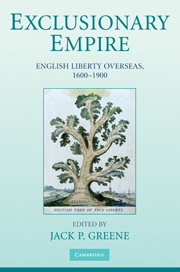Book contents
- Frontmatter
- Contents
- Notes on Contributors
- Preface
- Introduction
- 1 The Languages of Liberty in British North America, 1607–1776
- 2 Liberty and Slavery
- 3 “Era of Liberty”
- 4 Liberty and Modernity
- 5 Federalism, Democracy, and Liberty in the New American Nation
- 6 Liberty, Order, and Pluralism
- 7 Contested Despotism
- 8 “… a bastard offspring of tyranny under the guise of liberty”
- 9 How Much Did Institutions Matter?
- 10 The Expansion of British Liberties
- Index
6 - Liberty, Order, and Pluralism
The Canadian Experience
Published online by Cambridge University Press: 05 June 2012
- Frontmatter
- Contents
- Notes on Contributors
- Preface
- Introduction
- 1 The Languages of Liberty in British North America, 1607–1776
- 2 Liberty and Slavery
- 3 “Era of Liberty”
- 4 Liberty and Modernity
- 5 Federalism, Democracy, and Liberty in the New American Nation
- 6 Liberty, Order, and Pluralism
- 7 Contested Despotism
- 8 “… a bastard offspring of tyranny under the guise of liberty”
- 9 How Much Did Institutions Matter?
- 10 The Expansion of British Liberties
- Index
Summary
In any attempt to explore how ideas about liberty were received, articulated, and implanted in British North America (later Canada), that congeries of seemingly mismatched colonies and commercial territories perched on the northern reaches of the continent, a preliminary difficulty presents itself: Canadian historians have traditionally not used the concept of liberty as an organizing device. As observed recently in striking fashion by Michel Ducharme:
La liberté n'a jamais été abordée par les historiens comme le principe qui fonde la légitimité des relations de pouvoir et des rapports sociaux au Canada. Plus encore, la liberté, sous quelque forme que ce soit, n'a jamais été à la base d'aucune interprétation historique.
Three sets of interactions have traditionally dominated the study of Canadian history: French–English relations, first in an imperial, then in a domestic setting, dominated by the idea of military, political, and cultural conflict; domestic–imperial relations, dominated early on by a preoccupation with the achievement of colonial autonomy and the road to nationhood; and Canadian–American relations, dominated by the desire to explain and justify the existence of the northern nonrebelling colonies. In none of these has the idea of individual liberty been seen as a motive force. In fact, quite the contrary: Canadian historians, both French and English, trying, as historians of most countries have traditionally done, to justify the legitimacy of their nation, have always written with a wary eye on the republic of liberty to the south.
- Type
- Chapter
- Information
- Exclusionary EmpireEnglish Liberty Overseas, 1600–1900, pp. 160 - 190Publisher: Cambridge University PressPrint publication year: 2009
- 2
- Cited by



